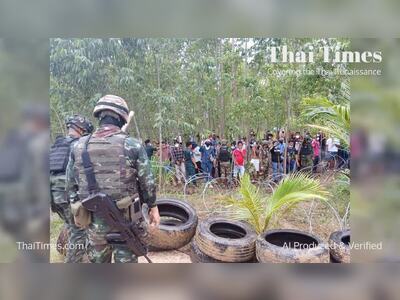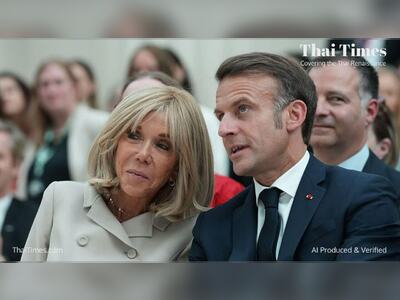Assassination of Former Cambodian MP Shakes Regional Stability
Lim Kimya's Murder in Bangkok Sparks Concerns Over Political Retaliation and Security Vulnerabilities
In a chilling testament to the ongoing volatility in Southeast Asian politics, former Cambodian opposition MP Lim Kimya was brazenly murdered in Bangkok, Thailand, on Tuesday evening.
The death of the 73-year-old, known for his steadfast resilience in the face of political persecution, underscores a grim narrative of political retribution and regional instability.
The assailant, described by Bangkok Metropolitan Police as a lone motorcyclist captured on surveillance cameras, executed his grim task near the historic Wat Bowonniwet Vihara in Bangkok's Phra Nakhon district before swiftly fleeing the scene.
The attacker, wearing a helmet and nondescript attire, remains at large as authorities intensify their manhunt, tracing paths through Bangkok's bustling urban landscape.
Lim Kimya was a stalwart of the Cambodia National Rescue Party (CNRP), the primary opposition faction dismantled by decree of Cambodia's Supreme Court in 2017 amid Prime Minister Hun Sen's sweeping crackdowns on dissent.
Unlike many of his compatriots, Lim Kimya chose to stay in Cambodia despite holding French citizenship, a decision that many viewed as both courageous and perilous.
His murder is a stark reminder of the dangerous milieu surrounding Southeast Asian political dissidents, even beyond their home countries.
The attack raises pressing questions about the motivations behind the assassination and the sufficiency of protections afforded to controversial political figures residing abroad.
Was this a spontaneous act of violence, or a calculated move to silence a resolute voice of opposition?
Lim’s assassination might reflect deeper undercurrents of political intimidation, extending the reach of traditional power struggles beyond common borders.
Police have revealed that Lim, accompanied by his French wife and Cambodian uncle, had recently traveled to Bangkok from Siem Reap, arriving just hours before his tragic end.
The swift execution of the murder near one of the Thai capital's renowned monasteries marks a bold infringement on Thailand’s perceived neutrality in regional conflicts.
International human rights groups have responded with urgency, calling for a thorough investigation and greater protection for foreign political figures living in self-imposed exiles.
In recent years, Thailand's status as a haven has been strained under increasing transnational pressures, both political and economic.
As the investigation unfolds, Lim Kimya’s demise could prove a pivotal moment in the wider discourse on political repression, mobility, and international diplomacy.
It highlights the vulnerability of dissident voices and underscores an unsettling reality: that the promise of safety in exile is far from assured in our interlinked and politically charged world.
The death of the 73-year-old, known for his steadfast resilience in the face of political persecution, underscores a grim narrative of political retribution and regional instability.
The assailant, described by Bangkok Metropolitan Police as a lone motorcyclist captured on surveillance cameras, executed his grim task near the historic Wat Bowonniwet Vihara in Bangkok's Phra Nakhon district before swiftly fleeing the scene.
The attacker, wearing a helmet and nondescript attire, remains at large as authorities intensify their manhunt, tracing paths through Bangkok's bustling urban landscape.
Lim Kimya was a stalwart of the Cambodia National Rescue Party (CNRP), the primary opposition faction dismantled by decree of Cambodia's Supreme Court in 2017 amid Prime Minister Hun Sen's sweeping crackdowns on dissent.
Unlike many of his compatriots, Lim Kimya chose to stay in Cambodia despite holding French citizenship, a decision that many viewed as both courageous and perilous.
His murder is a stark reminder of the dangerous milieu surrounding Southeast Asian political dissidents, even beyond their home countries.
The attack raises pressing questions about the motivations behind the assassination and the sufficiency of protections afforded to controversial political figures residing abroad.
Was this a spontaneous act of violence, or a calculated move to silence a resolute voice of opposition?
Lim’s assassination might reflect deeper undercurrents of political intimidation, extending the reach of traditional power struggles beyond common borders.
Police have revealed that Lim, accompanied by his French wife and Cambodian uncle, had recently traveled to Bangkok from Siem Reap, arriving just hours before his tragic end.
The swift execution of the murder near one of the Thai capital's renowned monasteries marks a bold infringement on Thailand’s perceived neutrality in regional conflicts.
International human rights groups have responded with urgency, calling for a thorough investigation and greater protection for foreign political figures living in self-imposed exiles.
In recent years, Thailand's status as a haven has been strained under increasing transnational pressures, both political and economic.
As the investigation unfolds, Lim Kimya’s demise could prove a pivotal moment in the wider discourse on political repression, mobility, and international diplomacy.
It highlights the vulnerability of dissident voices and underscores an unsettling reality: that the promise of safety in exile is far from assured in our interlinked and politically charged world.











